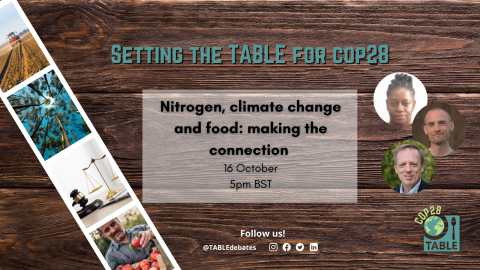
Nitrogen is essential to life - it is a building block of amino acids and therefore proteins, and it’s essential for soils and for growing food. Nitrogen, whether delivered in the form of mineral fertiliser, manure, compost or via the incorporation of nitrogen fixing legumes in crop rotations, is an essential input into agricultural production.
At the same time, nitrogen is a potent greenhouse gas, responsible for around 6% of global warming. When it comes to the food system, its contribution is more significant still, at around 16% of overall food related global warming (Tubiello F N et al 2021 Environ. Res. Lett. 16 065007). Its negative effects don’t end there however: surplus nitrogen pollutes soils, water and air, damaging fragile aquatic and land based ecosystems and causing multiple harm to human health.
Moreover, nitrogen’s impacts can be felt on different scales, making it an issue for local policy makers as well as for the global community. While nitrous oxide, as a greenhouse gas, is a problem affecting the whole world, other concerns are more context-specific. Some countries and farm systems suffer from the problems of excess nitrogen, including eutrophication and ammonia emissions, while others suffer from its insufficiency, the result being poor yields and hunger. So how can we get the balance right? How can we manage nitrogen at both the global and the local level in ways that minimise its harms while meeting our need for safe, nutritious food? Join TABLE for a panel discussion in which we:
- Highlight nitrogen’s role in the food system and its links to climate change
- Show how and why the food system is a major source of N2O emissions, highlighting particular foods whose production is responsible for particularly heavy impacts
- Highlight nitrogen’s other environmental impacts (e.g. eutrophication, ammonia)
- Discuss the pros and cons of the main forms in which nitrogen is delivered to soils - mineral fertiliser, manure, composts and legumes
- Consider the very different nitrogen requirements and concerns in the context of different countries - e.g. Sub Saharan Africa and the Netherlands.
- Consider the challenges and the solutions in the context of climate mitigation and our wider SDG goals. What are the options for reducing nitrogen emissions, both in terms of technical solutions and in the context of our overall goals for food system transformation? Do we need to apply, more, less or differently and where? How does dietary change fit in? And why do people disagree about how (and through what forms) we should meet our nitrogen needs while addressing our environmental problems?
Speakers:
Dr Wim de Vries is a professor at the Environmental Systems Analysis Group of Wageningen University, where he holds the chair "Integrated nutrient impact assessment”. He is a researcher in the field of biogeochemistry with special reference to nutrient cycling, soil acidification, greenhouse gas emissions and metal pollution. His research is organized around large scale impacts of the elevated use of nutrients (especially nitrogen and phosphorus) in agriculture on air-, soil - and water quality and related boundaries in view of those impacts. Wim de Vries wrote more than 500 publications as an author or co-author on the above mentioned topic, including ca 200 publications in international peer reviewed journals.
Rasmus Einarsson is a postdoctoral researcher in sustainable food systems at the Swedish University of Agricultural Sciences (SLU). He does quantitative research on the productivity, resource flows, and environmental impact of food systems. With a background in physics, he has an affinity for fundamental questions about biophysical possibilities and trade-offs between different aspects of complex systems. In his research, Rasmus has specialized in quantifying agricultural flows of nitrogen in various forms: as fertilizer input to plants, as protein in livestock feed and human food, and as environmental losses of nitrate, ammonia, and nitrous oxide that contribute to climate change, toxic pollution, and biodiversity loss.
Pauline Chivenge is a Senior Scientist in Cropping Systems Agronomy/Climate Change for the International Rice Research Institute (IRRI) based in Tanzania. Pauline earned a PhD in Soils and Biogeochemistry at the University of California, Davis. Most of Pauline’s research has focused on soil and nutrient management in smallholder farming systems in sub-Saharan Africa and Asia. She has led a couple of international projects, working in diverse farming systems on topics that include biogeochemical nutrient cycling, natural resource management, watershed management, carbon sequestration, greenhouse gas emissions and sustainable ecosystem functioning. She has supervised more than 20 MSc and PhD students in Africa and Asia and has published more than 40 peer-reviewed journal papers and several book chapters. Before joining IRRI, Pauline was a Principal Scientist at the African Plant Nutrition Institute (APNI) in Morocco.
Chair: Dr Tara Garnett, Director of TABLE
Watch the recording for this event.
To see the other events in the series, view this page.

